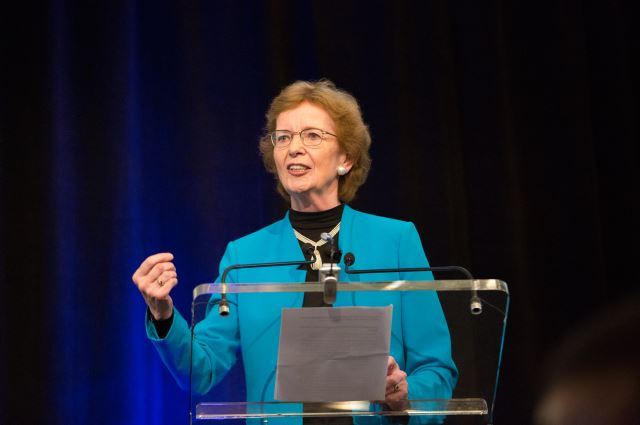Mary Robinson introduces a new series on climate change, COP21 and the right to health by the Health and Human Rights Journal.
I am delighted to welcome and launch this Health and Human Rights Journal series on climate change, COP21 and the right to health. The initiative is timely; on Monday October 19, 2015, climate negotiators will reconvene in Bonn, Germany, for the final five days of negotiations before the Conference of Parties (COP21) begins in Paris on November 30. This is an incredibly important year; 2015 could go down in history as the year that placed the world on a pathway to a safer, fairer and healthier world.
The climate agreement which will be adopted in Paris is the final piece of the jigsaw, following the adoption of the Sustainable Development Goals (SDGs) and the Addis Ababa Action Agenda – the financial framework to implement the SDGs. Together, the actions resulting from these three processes can enable the transformation necessary to set the world on course for a truly sustainable and equitable world for all.
The international community faces a great challenge in stabilising the climate. We need to reach zero carbon emissions by 2050 in order to have the best possible chance of keeping warming below 2°C above pre-industrial levels. However, the commitments made by countries to date in their Intended Nationally Determined Contributions (INDCs)—national targets for curbing climate-altering greenhouse gases—leave a considerable gap between the actions pledged and the action needed. If we continue with business as usual we are on track to a 4°C warmer world compared with pre-industrial levels. This would lead to extreme and potentially irreversible impacts on natural ecosystems and on human health.
Climate change is not just an issue of atmospheric science; it is also about human rights. Climate change undermines the enjoyment of the full range of human rights—from the right to life, to food, to shelter and to health. The situation is particularly acute for people living in vulnerable situations owing to geography, gender, age, race, poverty, disability or social status. It is an injustice that the people who have contributed least to the causes of the problem suffer the worst impacts of climate change.
The impacts of climate change on the right to health are now well understood. The 2015 Lancet Commission on Health and Climate Change documents the direct impacts of heat stress, droughts, floods and increased frequency of intense storms on human health; as well as the indirect impacts on health caused by air pollution, spread of disease vectors, food and nutrition insecurity and mental illness among others (1). The central finding of the 2015 Lancet Commission is “that tackling climate change could be the greatest global health opportunity of the 21st century”, so acting on climate change makes sense for health reasons as well as environmental and economic reasons (2).
This December in Paris world leaders have the opportunity to adopt a legally binding climate agreement that addresses the scale of climate action needed to safeguard human health. The right to health can provide a strong motivation for climate action as we have seen for example in the United States and China. Other rights such as the right to water and to food are similarly compelling drivers of ambitious action.
An ambitious agreement which provides a pathway for all countries to zero carbon is essential. Not only will a transition to zero carbon enable the world to stay within the available carbon budget, but it will also have significant health benefits. For example, the 2015 Lancet Commission finds that the phase out of coal would have immediate gains for health by reducing the health burden from air pollution with benefits for cardio vascular and respiratory health.
The integration of human rights considerations into climate policies is central to achieving climate action that is good for people as well as the planet. Without attention to human rights, climate policies and actions can have unintended negative impacts on people’s lives. We know that the risks to human rights from climate change are far more significant than the risks associated with a rapid phase out of carbon emissions. However, this does not negate the need to ensure that all actions respect human rights, and ensure gender equality, to deliver an orderly and just transition to zero emissions and zero poverty.
We are the first generation to understand how serious the climate crisis is and the last generation to be able to do something about it. Leaders around the world have a moral duty to act motivated by the injustice of the impacts of climate change and the opportunity to shape a fairer and safer world. The discussions that will take place in this blog series between now and COP21 can highlight the right to health as a strong motivator for ambitious climate action.
Mary Robinson is President, Mary Robinson Foundation – Climate Justice and UN Secretary-General’s Special Envoy on Climate Change, former President of Ireland and UN Human Rights Commissioner.
Mary Robinson wrote a Foreword in the June 2014 Health and Human Rights Journal special issue on Climate Justice and the Right to Health.
References
1 Health and Climate Change: policy responses to protect public health http://www.thelancet.com/journals/lancet/article/PIIS0140-6736(15)60854-6/fulltext accessed 30/09/15
2 Ibid
This article was first published on: Health and Human Rights Journal – A Global Movement Towards Health Equity on 14 October 2015.


